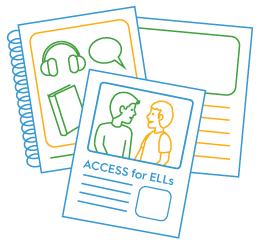Resources/Recursos
Featured Resources



All resources/Todos los recursos
Filter resources by:
Resources/Recursos
Developing Reading Comprehension and Academic Literacies
Many literacy programs were not designed to effectively use multilingual students’ knowledge, skills, and strengths. This Snapshot is the fourth in a five-part series that provides insights from relevant research and suggests ways to engage the significant strengths that multilingual learners bring to their literacy development.
Resource DetailsReleased January 2024
Expanding and Strengthening Vocabulary and Word Knowledge
Many literacy programs were not designed to effectively use multilingual students’ knowledge, skills, and strengths. This Snapshot is the third in a five-part series that provides insights from relevant research and suggests ways to engage the significant strengths that multilingual learners bring to their literacy development.
Resource DetailsReleased January 2024
Fostering Equitable Literacy Learning
Many literacy programs were not designed to effectively use multilingual students’ knowledge, skills, and strengths. This Snapshot is the fifth in a five-part series that provides insights from relevant research and suggests ways to engage the significant strengths that multilingual learners bring to their literacy development.
Resource DetailsReleased January 2024
Understanding WIDA MODEL Online Scale Scores in Terms of CEFR Levels
WIDA research findings show that WIDA MODEL Online scale scores can be interpreted in terms of Common European Framework of Reference for Languages (CEFR) levels. Use the tables in this document to look up students' MODEL scale scores and see the corresponding CEFR levels for each domain.
Resource Details View Download NowReleased December 2023
WIDA Proficiency Level Descriptors: Informing Expectations and Scaffolding
This Snapshot will give K-12 educators ideas on how to apply the Proficiency Level Descriptors as they consider scaffolding practices that support multilingual students in meeting grade level content learning goals.
Resource DetailsReleased November 2023
Using Embedded Universal Tools to Support Students' Test-taking Experience
This WIDA Focus Bulletin explores educators’ and students’ perceptions of the accessibility tools available to all students when taking an online WIDA assessment. The bulletin emphasizes the ways in which the universal tools can support the test-taking experience for multilingual learners.
Published October 2023
Authors: Jason A. Kemp, Ahyoung Alicia Kim
Released October 2023
Marco de los estándares del desarrollo auténtico del lenguaje español de WIDA
The Marco de los estándares del desarrollo auténtico del lenguaje español de WIDA (Marco DALE) is a Spanish language development standards framework with Language Functions and sample Language Features designed to guide Spanish language development. Este documento guía el desarrollo del lenguaje español de forma auténtica a ese lenguaje y a contextos bilingües mediante expectativas del lenguaje que contienen funciones del lenguaje y ejemplos de recursos lingüísticos.
Written in Spanish with English summaries
Resource Details View Download NowReleased October 2023
WIDA All Year Long
Learn how WIDA is more than a test! Mr. Vega is a 6th grade EAL (English as an Additional Language) teacher at an international school who works with colleagues and families to support multilingual learners. Follow Mr. Vega all year long, as he focuses on what his students can do, using WIDA resources to collaborate and plan effective learning activities throughout the school year.
Resource Details View Download NowReleased September 2023
Are We Ready? Educators Collaboration Guide and Notetaker
The Are We Ready? Educators Collaboration Guide is for PreK-3 educators to use for reflection and planning connected to promoting and providing equitable transitions for multilingual children and their families. Use the Are We Ready? Educators Notetaker to write down your own ideas and transition plans.
See the Teaching in PreK-3 page for context.
Resource Details View Download NowReleased August 2023
Are We Ready? Schools and Programs Collaboration Guide and Notetaker
The Are We Ready? Schools and Programs Collaboration Guide is for PreK-3 school and program leaders to use for reflection and planning connected to leading equitable transitions for multilingual children and their families. Use the Are We Ready? Schools and Programs Notetaker to write down your own ideas and transition plans.
See the Teaching in PreK-3 page for context.
Resource Details View Download NowReleased August 2023
Are We Ready? Districts and Programs Collaboration Guide and Notebook
The Are We Ready? Districts and Programs Collaboration Guide is for PreK-3 district and program leaders to use for reflection and planning connected to leading equitable transitions for multilingual children and their families. Use the Are We Ready? Districts and Programs Notetaker to write down your own ideas and transition plans.
See the Teaching in PreK-3 page for context.
Resource Details View Download NowReleased August 2023
Are We Ready? Recommended Readings and References
This list has recommended readings and references for PreK-3 educators and leaders to use to explore equitable language-focused transitions for multilingual children and their families.
See the Teaching in PreK-3 page for context.
Resource Details View Download NowReleased August 2023
Language-Focused Planning Tool: Annotated Guide
What should PreK educators consider as they adopt a language-focused approach to planning equitable learning opportunities for multilingual children? Use this Annotated Guide to explore guiding questions designed to help you use the Language-Focused Planning Tool.
Resource Details View Download NowReleased June 2023
WIDA Guiding Principles of Early Language Development
The WIDA Guiding Principles of Early Language Development provide practitioners with a broad perspective on key concepts related to the language development of young children learning multiple languages. To further clarify the guiding principles, these research highlights provide practitioners with research-based descriptions and examples of effective practices.
Resource Details View Download NowReleased June 2023
WIDA Early Language Development Standards
The WIDA Early Language Development Standards, available for English and Spanish language development, are designed for use with children ages 2.5–5.5 years old and correspond to five domains of children’s development and learning: approaches to learning, language and communication development, cognition and general knowledge, physical well-being and motor development, and social and emotional development.
Resource Details View Download NowReleased April 2023
Making Connections (Michigan)
Making Connections: Using the Michigan Early Learning and Development Standards and WIDA Early Years Resources to Plan Instruction for Young Multilingual Children is a comprehensive resource that offers suggestions, tools, and sample plans for teachers who use the Michigan Early Learning and Development Standards and WIDA resources to plan equitable learning opportunities for young multilingual children.
Resource Details View Download NowReleased February 2023
Sample Alternate ACCESS Individual Student Report for Educators
This version of the report is for educators and provides information about a student’s scores on the Alternate ACCESS English language proficiency test. This test is based on the WIDA Alternate English Language Development Standards and is used to measure students’ progress in learning English. Scores are reported as Language Proficiency Levels and as Scale Scores.
Resource Details View Download NowReleased February 2023
Supporting Multilingual Learners' Language Growth Through Language Development Portfolios
This Focus Bulletin illustrates how teachers and students can use language development portfolios to interpret and document language growth. The bulletin follows the story of how a grade-level team introduced portfolios to their practice, posing several questions the team asked as they refined their usage. It closes by offering two sample tools that teachers can use and adapt to capture multilingual learners’ language growth using modified Proficiency Level Descriptors (PLDs) from the WIDA English Language Development Framework, 2020 Edition.
Published: December 2022
Authors: Fernanda Marinho Kray, Margo Gottlieb, Lynn Shafer Willner
Released December 2022
Gathering and Reflecting on Families’ Language and Cultural Goals
This WIDA Snapshot focuses on how you can gather information and reflect on the language and cultural goals families have for their children.
Resource DetailsReleased November 2022
Making Connections (Washington)
Making Connections: Using the Washington State Early Learning and Development Guidelines and WIDA Early Years Resources to Plan Instruction for Young Multilingual Children is a comprehensive resource that offers suggestions, tools, and sample plans for teachers who use the Washington State Early Learning and Development Guidelines and WIDA resources to plan equitable learning opportunities for young multilingual children.
Resource Details View Download NowReleased September 2022




